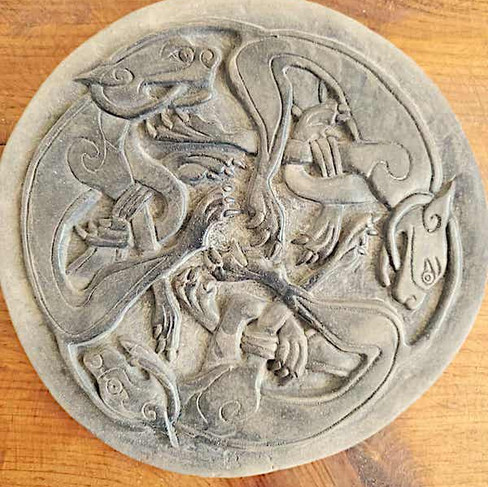Exclusive Excerpt From The Long Road To Flin Flon: The Chase & The Chasing Dogs
- Megan Routledge

- Oct 26, 2025
- 7 min read

The Chasing Dogs: Image by Stevie Connor.
Introduction by Megan Routledge
In this chapter, Stevie Connor takes us on a journey through the heart of Scottish music, weaving together personal memory, tradition, and the exhilaration of creative collaboration. From the narrow streets of Edinburgh to the expansive stages shared with some of the country’s most revered musicians, Stevie’s story is one of dedication, mentorship, and the quiet moments that shape a lifetime.
Here, he reflects not only on the milestones — the Centenary March, the Wolfstone recording, the encounters with Dougie Pincock and the Battlefield Band — but also on the intangible gifts of music: the friendships formed, the lessons learned, and the sense of belonging that comes from following a passion with unwavering devotion.
With warmth, insight, and a deep reverence for the traditions that have guided him, Stevie invites readers to step into his world, to hear the melodies behind the milestones, and to walk with him along The Long Road to Flin Flon.

Stevie Connor, Markham, Ontario, Canada, 2011.
The sun dipped low over the Edinburgh skyline, casting long shadows through the narrow streets of the city. In my little bedsit at the top of Leith Walk, surrounded by the relics of my musical journey, I inhaled the faint scent of ageing wood and polished silver, emanating from the bagpipes resting in their case on the floor. Each drone and chanter was a whisper of my heritage, a lineage of sound passed down from my father, whose steadfast fingers had first taught me rhythm and patience.
It all began in the embrace of the Lothian and Borders Police Pipe Band, a world where young dreamers like me found solace in resonance and camaraderie. My father had set the tempo of my footsteps, and with each note, I followed the path he had carved. The melodies flowed, born of tradition but infused with the spirit of youth, carrying me across the Highland landscapes of my imagination. The pinnacle came with the Centennial album, a celebration of a hundred years of the Police band, when my composition, The Centenary March, was chosen to be immortalized in those grooves. Pride swelled in my chest, a nod to tradition and a whisper of innovation intertwined.
Another of my compositions found it's way onto that recording, a lively 6/8 jig, The Pitlochry Depth Charge which was named after a drink and a particular night of revelry in the beautiful Scottish highland town — a Depth Charge is a shot of whisky dropped into a pint of Guinness.
The Centenary March, composed by Stevie Connor.
By the time I found my place in the archives of the Lismore recording around 1990, another chapter of my journey had unfolded alongside the notes of renowned pipers, a testament to the timelessness of Scottish music.
Yet life, as it always does, nudged me forward, and I stepped away from the familiar warmth of the Police band. Four years unfurled like musical manuscripts, each page penned in collaboration with different ensembles. The Scottish Gas Pipe Band and the City of Glasgow Pipe Band became canvases for my melodies, each under the guidance of maestros like Pipe Major Gordon Campbell and Pipe Major Davie Wotherspoon.

Photo Credit: Dougie Pincock, West Highland Free Press.
Then came Dougie Pincock, a gifted piper and band mate among the ranks of The City Of Glasgow Pipe Band, a man whose life and music are inseparable. Born in Govan and raised in Barrhead, Dougie’s journey began with the bagpipes in primary school, nurtured by John MacFadyen and John Garroway, refined at the College of Piping under Angus J. MacLellan and Ronald Lawrie. By thirteen, he was under the mentorship of Pipe Major Iain MacDonald, whose teachings opened him to the instrumental revival in Scotland and Ireland — The Chieftains, Planxty, The Bothy Band, The Tannahill Weavers. Dougie went on to perform with the acclaimed Glasgow band Kentigern, then joined the Battlefield Band, expanding his skills to whistle, flute, saxophone, bodhran, vocals, and even the drum machine — blending traditional sound with modern innovation.
Dougie joined the Battlefield Band, with their pioneering blend of synthesizers, keyboards, pipes, and fiddles, they were always there in my young consciousness. Their motto, “Forward With Scotland’s Past,” was more than words; it was philosophy. Years later, meeting Alan Reid and Rob van Sante at our home in Toronto was surreal. To stand in the presence of two of my childhood heroes, men whose soundtracks had accompanied my earliest ambitions, was a reminder that music is both lineage and living experience.

Stevie with Battlefield Band members, Alan Reid (Left) and Rob van Sante (Right)
Dougie Pincock was generous beyond measure. One evening, his voice crackled down the phone in my Edinburgh bedsit. “Stevie,” he said, warm and familiar, “I’m in the studio with Wolfstone. Phil Cunningham and the guys love your tune Lori Connor. Can we use it for the album we’re recording?” The answer was immediate, a resounding yes that filled the room with exhilaration. Legal papers were quickly sent through to me from the record label, signed and returned giving permission for the tune to be used.
Wolfstone themselves were legends in their own right. Formed in 1989, they fused traditional Scottish music with rock sensibilities, carving a space for themselves with albums like Wolfstone, Wolfstone II, and the gold-status The Chase. Fiddler Duncan Chisholm, guitarist Stuart Eaglesham, and vocalist Ivan Drever built a sound that was simultaneously raw and refined, rooted in tradition yet propelled by energy and imagination.

The recording of The Chase was electric. On the recording Dougie’s fingers flew over the chanter, then switched seamlessly to whistle, then flute, each note immaculate yet alive, imbued with humour and heart. Phil Cunningham’s accordion danced around Wolfstone’s driving guitars and drums, and on the particular track my tune was included on, they had turned my modest composition into something I could never have imagined.
The Appropriate Dipstick, a set of tunes including Lori Connor, became part of Wolfstone’s celebrated album The Chase. When I first heard the finished tracks in my bedsit, the drones soaring over the guitars, the percussion breathing life into the rhythm, I felt a wave of humility and awe.
A modest cheque of thirteen pounds and twenty-six pence arrived later, a sum dwarfed by the real reward: the knowledge that my melodies had found their place among giants, the name, Steven D. Connor, appeared on the sleeve notes alongside the legends that are Phil Cunningham and Addie Harper, you just can't make that up.
Through it all, the people I played with, the maestros I admired, and the bands I had the privilege to meet had become friends, and custodians of a living tradition. I remain forever grateful to Dougie, to Phil, and to the lads of Wolfstone for giving my composition a life of it's own on such a remarkable album.
Life, I’ve learned, is much like a long, winding pipe march — a series of steps guided by rhythm, punctuated with unexpected flourishes, and defined by the company you keep.
Each performance, each rehearsal, each small triumph is a note in the composition of your life. And as I look back on the road I’ve travelled, from the streets of Edinburgh to the stages and studios across the world, I realize that I have been blessed. To have walked, and occasionally stumbled along, The Long Road to Flin Flon has been a journey of music, memory, and meaning.
Footnote: The Chasing Dogs
Circa 2009 in Port Credit, ON, Canada, the beautiful village in the Greater Toronto Area, a part of the city we call home, my wife Anne, and I were wandering around a music festival just across the street in Memorial Park, Anne was drawn to a vendors stall.
Years after hearing my tune come alive on Wolfstone’s The Chase, Anne gave me a gift that felt like a whisper from the past, the person who created the Celtic sculpture was the artist Duncan MacDonald, titled The Chasing Dogs. It now hangs in our living room, a silent, powerful reminder of the journey that began in those narrow streets of Edinburgh.
MacDonald’s work is steeped in the very spirit that shaped my own path, a fusion of history, mythology, and the timeless rhythm of the Celtic soul. A native of Britain with his studio on the Isle of Islay, Duncan devoted himself to sculpting full-time in 1992 after years in London’s film industry, creating props and scenes that captured imagination and story. His art breathes life into the pagan symbols and pivotal moments of Scottish history, each piece carved after deep research and reflection. Cast in cement fondue, a centuries-old French process, his sculptures feel as enduring as the stones of the Highlands themselves. He moves between his homes in Collingwood, Ontario, Canada and the island of Islay, Scotland.
In The Chasing Dogs, he captured the essence of the Celtic hunt, not merely pursuit, but transformation. In Celtic mythology, the hounds are guardians, messengers, and seekers of truth, forever chasing that which lies just beyond reach. For me, they symbolise the eternal pursuit of creativity and purpose, the same restless drive that carried me from the Lothian and Borders Police Pipe Band to hearing my music soar through Wolfstone’s legendary sound.
Website: duncanscelticstonework
Every time I look at that sculpture, I’m reminded that the chase was never about catching something tangible. It was about the music, the movement, the journey itself, and the people, like Dougie Pincock, Phil Cunningham, and my wife, who helped light the way.
Life, after all, is one long chase, not toward fame or fortune, but toward understanding who we are, where we come from, and what we leave behind.
And in that spirit, I’m grateful — profoundly, to have travelled The Long Road to Flin Flon.

Stevie Connor, a Scottish-born polymath of the music scene, is renowned for his versatility across various domains within the industry. Initially destined for football, Stevie's heart found its true calling in music. His multifaceted journey has seen him excel as a musician, composer, recording artist, journalist, and internet radio pioneer.
In 2012, Stevie laid the foundation for Blues and Roots Radio, an online platform that quickly became a global stage for blues, roots, folk, Americana, and Celtic music. His visionary leadership propelled the platform to international acclaim. Not content with just one venture, Stevie expanded his influence in 2020 by founding The Sound Cafe Magazine, a multilingual platform dedicated to artist interviews, album reviews, and music news.
Stevie's impact extends beyond these platforms. His discerning ear and industry acumen have presented opportunities to be selected as a juror for national awards such as the JUNO Awards, and the Canadian Folk Music Awards. Through his tireless efforts, he has earned a solid reputation within the music community, garnering respect from peers and artists alike.
Despite his extensive responsibilities, Stevie remains deeply connected to his roots, both musically and geographically. He continues to contribute to the vibrant tapestry of the music world, ensuring his influence resonates far beyond any single platform. Stevie's enduring passion and commitment to music make him a true luminary in the industry.
Stevie is a verified journalist on the global PR platform, Muck Rack.
Read More By Stevie ...
www.thesoundcafe.com/post/from-peebles-to-summerfolk-close-encounters-from-the-past-meeting-jackie
www.thesoundcafe.com/post/exclusive-the-long-road-to-flin-flon-the-birth-of-blues-roots-radio
www.thesoundcafe.com/post/exclusive-article-between-the-notes-the-heart-of-mick-hanly
www.thesoundcafe.com/post/exclusive-article-the-resilience-and-radiance-of-kat-goldman
www.thesoundcafe.com/post/exclusive-article-chapter-excerpts-from-the-long-road-to-flin-flon
www.thesoundcafe.com/post/introduction-the-long-road-to-flin-flon






